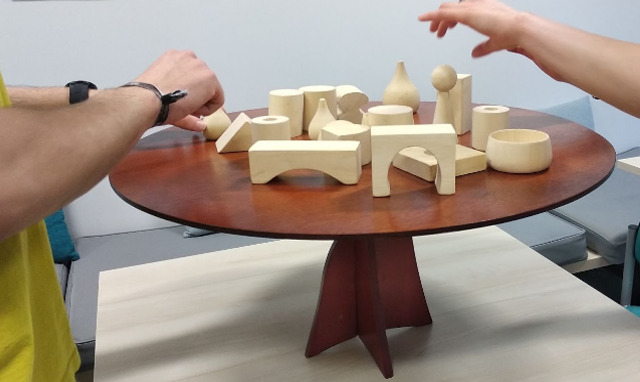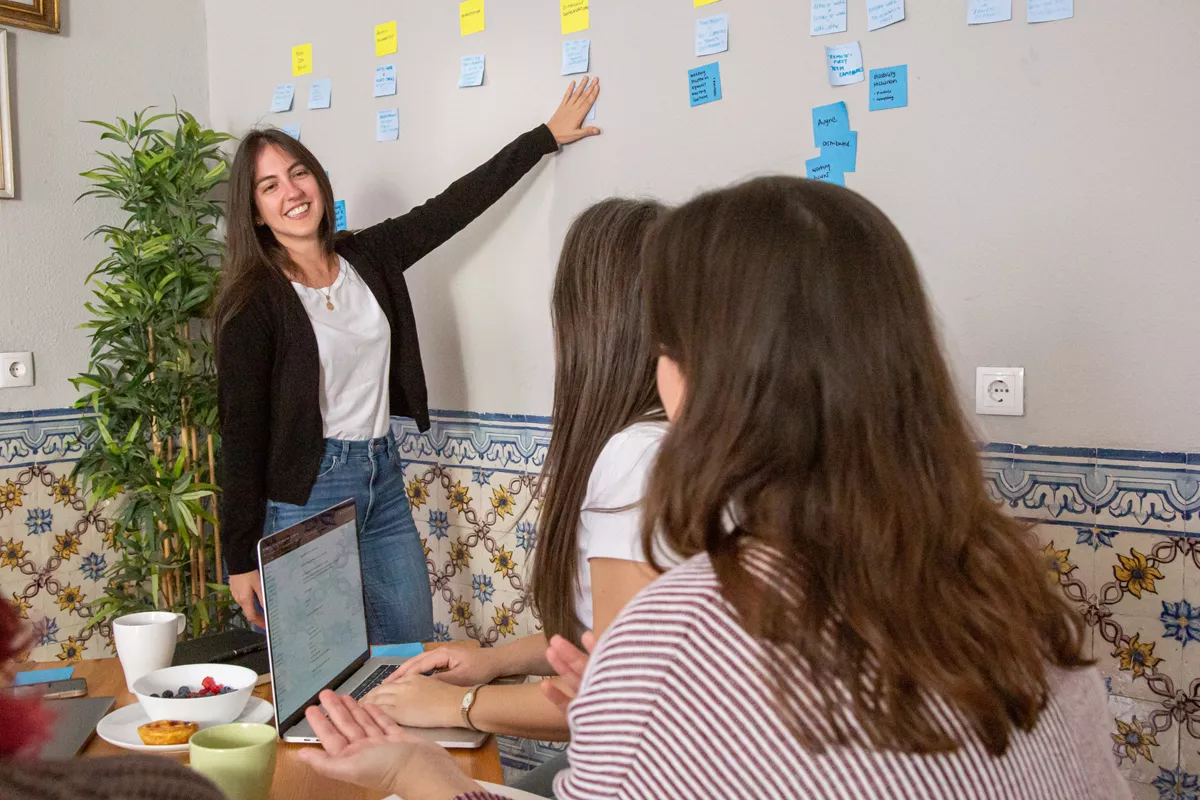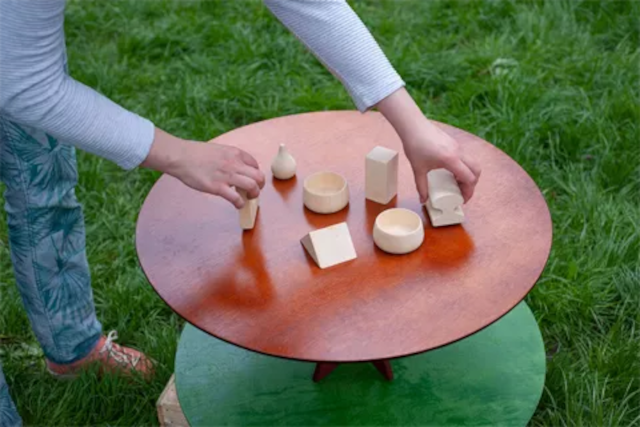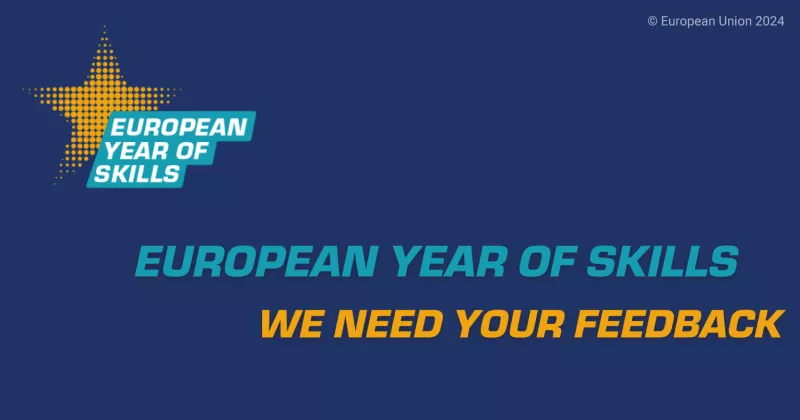Using building games in task delegation training - a case study
7 min read – like, share, comment!
First published in Polish by Agnieszka Leśny
How to use building tasks to train young adults' managerial skills?
I used the exercise described below during classes with students as part of the "Entrepreneurship Incubator" cycle at the University of Warsaw. It was intended for young students starting their careers as leaders and managers. The workshop involved Harvey Sherman's 6 levels of task delegation. This is an interesting concept which may prove helpful for people at this stage of development. Several theory books describe this concept, but I chose to look for practical situations where this theory could be applied. I chose to use the Balanseo building set created by the Foundation for which I work, the Science and Adventure Laboratory. This set is ideal for it! Later in this article, I will also recommend other solutions and tools.

What is delegation, and why is it so important?
Delegation may be one of the basic tasks to be performed by managers/leaders. It is the informed distribution/division of tasks to be performed by one or more people, for example, by team members. Why do managers delegate tasks? There are several reasons for it. Manager is said to be good if they have enough time to support their team members and help them with proper work organisation. Therefore, good managers are not the ones overloaded with too many tasks. To have enough time for others, you cannot have too many responsibilities and tasks to perform (some people call this way of delegating "downward delegation").
Another reason is the willingness to entrust tasks to experts ("upward delegation"). Managers do not have to be versed in anything that goes on in the organisation - they should not. Their role is to organise the best conditions for experts' work, which will then share their valuable knowledge with the organisation. In non-governmental and educational organisations, delegation is also a way to support young leaders' development. They can develop and improve by assuming responsibility and enjoying the support of more experienced team members.
Task delegation is also necessary for people who should see the organisation from a long-term perspective. Focussing on current problems may well obscure the view. Interesting and engaging tasks may be a form of reward, boosting an employee's/organisation member's motivation or involvement.
Harvey Sherman's 6 levels of task delegation
The concept of Harvey Sherman's 6 levels of task delegation will probably appear in the top 10 hits when searching: "How to delegate tasks". Moreover, although it is very old (1966! [1]), it remains a starting point for quite many contemporary delegation concepts. The levels in question are:
Level 1: Look into this problem – give me all facts and information; I will decide what to do.
Level 2: Look into this problem – let me know alternative actions available with pros and cons and recommend one for my approval. I will decide.
Level 3: Look into this problem – let me know what you intend to do; delay action until I approve.
Level 4: Look into this problem – let me know what you intend to do; do it unless I tell you not to.
Level 5: Take action – let me know that you did.
Level 6: Take action – no further contact with me is needed.

What do the individual levels involve?
Level 1: collect and relay information
"Please get as much information as possible about it". When delegating at this level, managers expect their subordinates to investigate their problem, look at the situation and share their observations - to prepare and collect the "knowledge" necessary for making a decision.
Seemingly, subordinates do not participate in decision-making but provide vital information to the decision-makers needs. Through gathering and selecting information, they get involved in decision-making.
Level 2: collect and relay information and provide suggestions
"Please bring me relevant information (event, area, problem, challenge) and consider what to do in this situation".
Subordinates are still not personally involved in decision-making, but their manager relies on their information and suggestions concerning possible solutions.
Level 3: collect information, develop an action plan, and gain approval
This level differs from the previous two because subordinates develop an action plan that should only be approved by their superior or leader. Should a decision be difficult, they can make it together.
Trust between the manager and their team members is necessary to reach this level.
Level 3 is thought to be of key importance for developing employees' and organisation members' competencies. It requires coaching skills and lots of time from the manager. This level is applied in organisations geared towards their members'/employees' development.
Level 4: collect information, and prepare a holistic proposal of actions to be taken and implemented under the supervision
"Please look into the problem. Develop an action plan and present it to me, please. Let's see together if it is in line with our strategy before we implement it".
This level involves employees'/organisation members' significant independence. This is no longer the performance of a delegated task; this is assuming responsibility for it. The more experienced a given employee is, the more likely their superior's approval will depend on their recommendations. Preparing a financial report by an accountant whom a board member finally signs is a good example.
Level 5: Collect information, prepare and implement an action plan, + report
"Please tell me the project's status, prepare an action plan and implement it. Let me know your decision and its results".
At this level, the person entrusted with a task has lots of freedom and is mainly responsible for implementing the task. That kind of work is possible in a team with lots of trust and independence and where its members are proactive.
Level 6: collect information, prepare and implement an action plan
"Hi there, today we are dealing with two large challenges: X and Y. Can you take challenge X? I will take Y. Let me know if you need help".
At this level, it is not so much about delegation as about shared responsibilities. In this case, managers do not need to verify or supervise the implementation of tasks - team members act as equals and help each other.
The above categorisation is quite a simplification. Sherman stood no chance of considering modern trends, empathy-based relations, turquoise management or situational leadership. However, this concept is a good exercise for people who learn the fundamentals of task delegation and sharing, which is why it is often included in beginner courses.
From theory to practice
I wanted to use a building game during my classes with students. I often use this kind of the challenge; this is my "must-have" training tool. Interesting and tangible materials and the hands-on approach mean that several senses must be used to solve a problem. In my opinion, games and riddles guarantee participant engagement. Moreover, such tasks stimulate group members needing action and movement for effective learning.
I chose Balanseo, a set of building blocks put on a wobbly disc. Balanseo may make people think about entertainment programmes, and rightly so! Such a wobbly table is excellent when working with children or at parties for adults. Its developmental and educational potential is impressive and may be applied to many programmes involving building games. Other toys or sets/building games may be used for this task, for example, building blocks (Lego, Duplo – be sure to try LEGO® SERIOUS PLAY®), Marble Ball run, Jenga – anything which requires the building or reconstructing of a model or performing specific activities to solve a problem (but not a spaghetti tower - it is passé:]).

I divided my student group into twos. One person was to be the manager, the other - the employee. The managers were in one room and did not see the task faced by the employees. Balanseo was in the other room, which could be accessed by the employees only. The managers were responsible for the performance of the task, and having been allocated a specific delegation level, their task was to steer and manage the process in a way enabling their employees to perform the task - to take off the most extensive number of building blocks from the wobbly disc. The construction of the task contained many challenges that metaphorically echoed contemporary occupational and organisation-related challenges.
What was the instruction given to the managers?
"Your group have to take as many building blocks as possible off the wobbly disc, which is not supposed to fall over.
You have one employee at your disposal. You are working with them at level ...... of task delegation: ............. (describe the relevant level here).
You have to agree with your employee on a method of communication; how often and when the information coming from them is to reach you.
Take notes on how often the employee will approach you, how many questions will be asked and how many times they will ask for a decision and how many times - for advice".
We all had a good laugh. The employees kept running back and forth, describing to the managers what they could see, what their task entailed and how they interpreted it. The lower the task delegation level - the more running about, discussions and waiting for a decision. As early as after some minutes, the twos being allocated lower levels of delegation envied those whose levels were higher. Some of them were frustrated by the lack of independent action, wasting time going about the rooms and waiting for their manager to make a decision they could make themselves. When I watched those activities, I remembered when I worked in an office and kept running with one letter between the accountant, lawyer, manager and the countersignature office. No more!
Do you know other interesting examples of tools, methods and approaches to training task delegation with young adults? Leave your inspiration in the comments under the text.
Agnieszka Leśny –pedagogue and cultural studies scholar, scientifically affiliated with the Faculty of Pedagogy of the University of Warsaw. She works in project mode in various areas of education and business. She specialises in building commitment, effective communication, talent management, working on the team's strengths, and creating and implementing a vision of change in organisations. She uses experiential education methodologies with a particular focus on outdoor/adventure education (adventure pedagogy) and games and gamification. Co-designer of several games, including the first management game about the so-called Gallup talents, "Expedition of Power". President of the Science and Adventure Workshop Foundation. She is pursuing a doctoral project on 'School under sail' cruises. EPALE Ambassador.
Further reading:
Crisis, conflict and trauma during training (part #1)
How to deal with trauma during a training? (part #2)
The elephant’s dilemma: the effectiveness or flashiness
Checklists, a strong and simple development method oriented at implementation
Mistakes in training? Yes, please
Bibliography:
[1]“It All Depends: A Pragmatic Approach to Organizations (University, Ala.: University of Alabama Press, 1966)”.






Fajny przykład struktury gry!
Fajny przykład struktury gry! Myślę, że świetnie się sprawdzi przy omawianiu, jak komunikować się w sposób zrozumiały, szczególnie w przypadku presji czasu. I to jest bardzo istotne w delegowaniu. Brakuje mi w tej strukturze ćwiczenia 2 elementów. 1. W tej grze w pełni ćwiczy jedna osoba (manager), a powinni praktykować wszyscy. Być może jakiś system rotacyjny lub mniejszych podgrup w jakimś stopniu może to zaadresować? 2. Brakuje mi możliwości praktykowania właśnie delegowania, a nie samej komunikacji. Elementem gry powinno być także podejmowanie decyzji - co delegować? na jakim poziomie delegowania (skoro na ten schemat się powołujemy)? komu? I taka gra by mi się przydała - jesteś w stanie coś może polecić takiego? :)